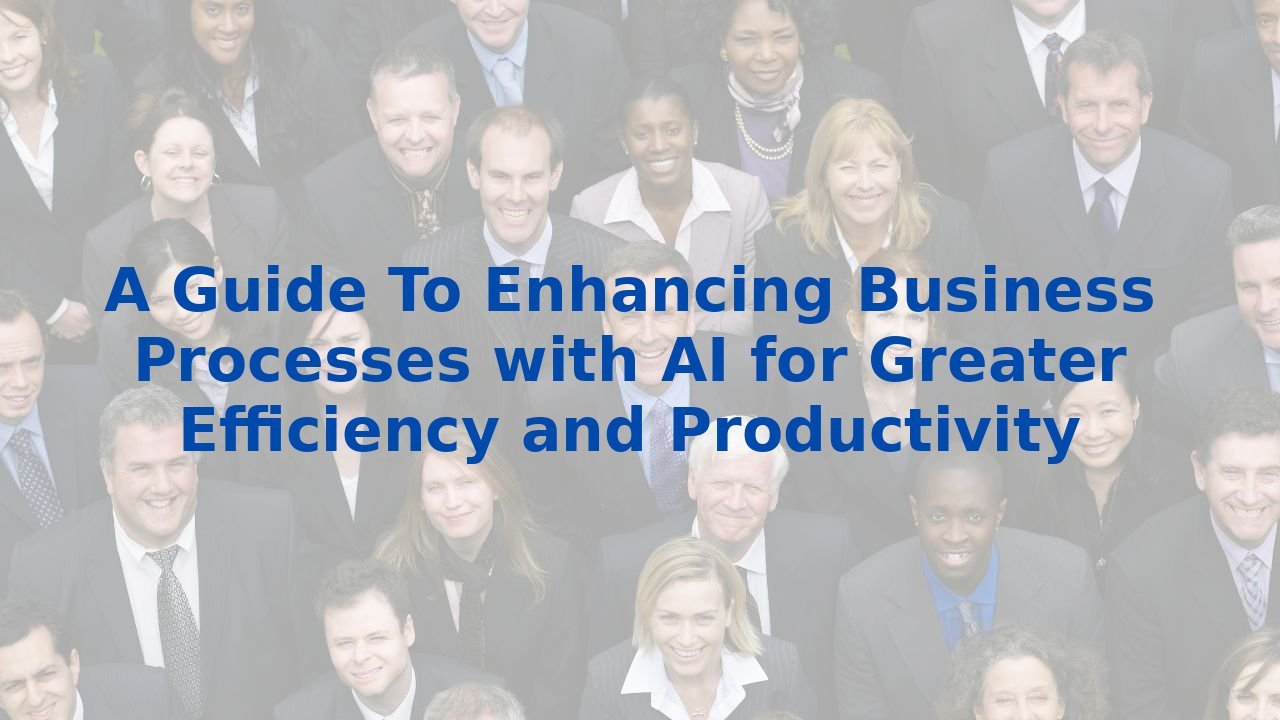A Guide To Enhancing Business Processes with AI for Greater Efficiency and Productivity
A Guide To Enhancing Business Processes with AI for Greater Efficiency and Productivity
In an era defined by rapid technological advancement, organizations are continually seeking ways to streamline operations and boost productivity. Enter artificial intelligence (AI)—a transformative tool reshaping business processes across various sectors. By harnessing AI, companies can elevate their efficiency while remaining competitive in this high-paced environment.
1. Sales and Marketing
The sales landscape is often chaotic, riddled with tasks fighting for attention. AI helps tame this chaos by automating repetitive tasks and providing targeted insights. For instance, AI analytics integrated within customer relationship management (CRM) systems can identify high-potential leads, guiding sales teams to focus their efforts where they count the most. Furthermore, chatbots enhance the customer journey by answering inquiries round-the-clock, personalizing experiences, and suggesting appropriate sales channels.
2. Customer Service
Customer service is an area ripe for AI innovation. By automating basic inquiries, AI liberates human representatives from mundane tasks, enabling them to focus on more intricate issues that require nuanced understanding. AI technologies also facilitate real-time assessments of service quality, allowing organizations to continually refine their customer interactions and maintain high service standards.
3. Product Development
The product development cycle can be labor-intensive. However, AI-powered generative design software can simplify this process. By evaluating several design possibilities based on user input, companies can avoid the lengthy prototype phase, saving both time and resources. This creates an agile approach, allowing organizations to pivot swiftly based on market demands.
4. Human Resources
AI’s role in human resources is expanding rapidly. In streamlining recruitment processes, AI can conduct preliminary assessments of candidates, drastically reducing the workload on HR teams. Additionally, AI customizes employee career paths and automates repetitive tasks such as onboarding, drastically enhancing the overall efficiency of HR operations.
5. Process Automation and Optimization
Automation through AI is revolutionary, especially in routine tasks like document processing. Intelligent document processing (IDP) leverages AI to convert both paper and digital documents into actionable data, eliminating manual entry and reducing error rates. This enhancement not only improves accuracy but also frees employees to engage in higher-value activities, investing their time where it matters most.
6. Decision-Making and Risk Management
Data-driven decision-making has never been more critical. AI algorithms can analyze vast datasets to provide predictive recommendations, informing businesses on everything from pricing strategies to risk assessments. By understanding potential future outcomes based on historical patterns, organizations can position themselves strategically and ensure optimal profitability without sacrificing customer trust.
7. Continuous Improvement
AI facilitates a culture of continuous improvement. By generating real-time feedback and insights, organizations can iteratively refine their processes to align with objectives and industry standards, ensuring they remain competitive. This dynamic adaptability is crucial in a landscape marked by constant change.
The Benefits of Integrating AI into Business Processes
- Improved Efficiency: AI reduces the burdens of manual tasks, allowing for more streamlined operations.
- Enhanced Decision-Making: Data-driven insights empower organizations to make smarter, more objective choices.
- Increased Productivity: Automating routine activities enables employees to focus on strategic initiatives.
- Better Customer Experience: AI-driven tools enhance customer interactions and satisfaction.
- Reduced Costs: By minimizing manual interventions, AI can significantly cut operational costs.
The Importance of Employee Training for AI
Implementing AI is just one piece of the puzzle; realizing its full potential lies in training employees to integrate and utilize these tools effectively. Comprehensive training includes:
- Understanding AI Capabilities: Employees must grasp the breadth of AI's capabilities to integrate it seamlessly into their roles.
- Hands-On Experience with AI Tools: Familiarity with AI tools equips teams to use them proficiently.
- Interpreting AI Insights: It's essential for employees to not only trust AI-generated data but also to leverage it in making informed decisions.
- Adapting to Change: Cultivating a mindset open to innovation prepares teams for the evolving nature of technology and processes.
As organizations embrace AI, it becomes paramount to equip employees with the training they need. By integrating AI into core business processes and investing in talent development, companies can drive efficiency and productivity, positioning themselves to thrive in an ever-changing market.
Conclusion
AI is not merely a technology; it is a catalyst for transformation within organizations. By enhancing processes from sales to product development and beyond, AI holds the key to unlocking unparalleled efficiency and productivity. For organizations to stay ahead, understanding the intricacies of these benefits and nurturing a skilled workforce will undoubtedly lead to sustainable success. Embrace AI, elevate your organization, and move forward with confidence.



